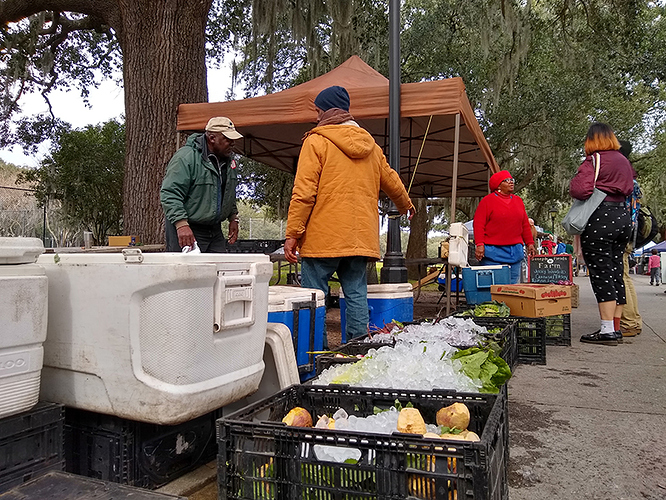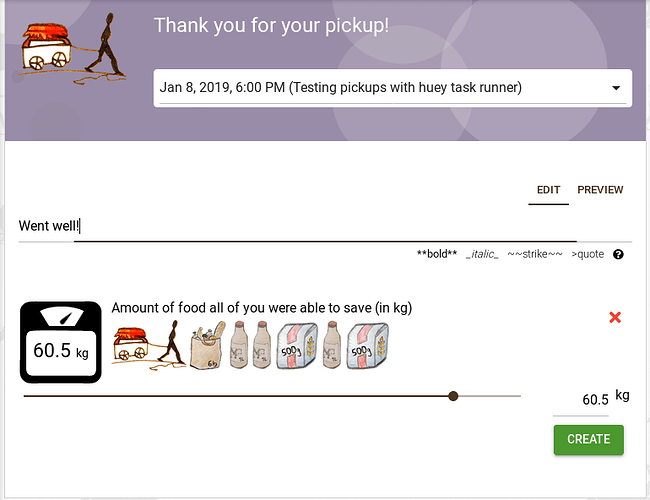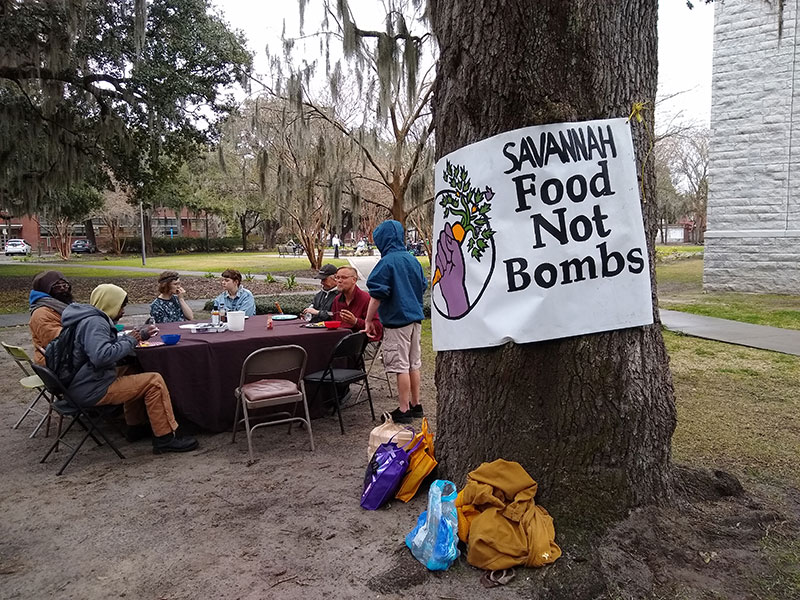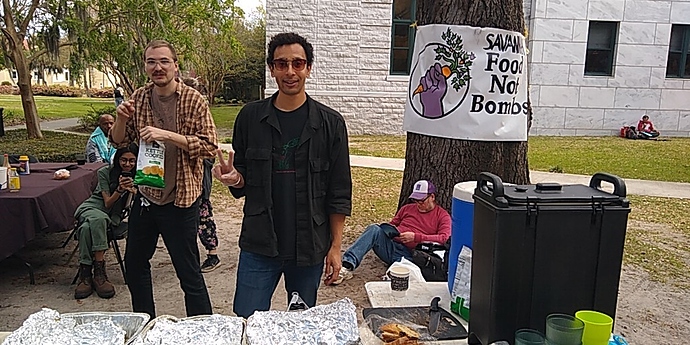Greetings from Savannah, Georgia USA. I volunteer with the Savannah group of Food Not Bombs. I’m here to learn more about this platform and from you all. Cheers!
Hello there, @wutougui!
So cool that you found your way here all the way from the USA and that you now want to connect with other foodsavers! 
I’d love to learn more about your local group in Savannah and the activities you normally do! And, of course, if you have any questions regarding this forum, the movement itself or our precious Karrot, please don’t hesitate to ask! 
Hi hi! Whew a lot more space over here in this forum! 
To continue the conversation from the Karrot platform:
…I would like to help though. I’ve been hoping there was a an app like this since I started doing the food collection volunteering. I’m new to open source development but a pretty good independent learner.
Perhaps there would be a simple task that you would recommend I could do?
By the way, I will talk with some farmers and store owners today about tax policy when I go to collect food soon.
Have a good day 
Hey! Just read the thread conversation on Karrot, great to hear more about what’s going on over there 
The mention of UX stuff was music to my ears  - this is one of the areas we find quite difficult to improve on, I think Karrot looks pretty nice for a volunteer community developed app (using https://quasar-framework.org/ gives us a good start with nice components), but when it comes to where to put all the buttons I think we can improve on this a lot!
- this is one of the areas we find quite difficult to improve on, I think Karrot looks pretty nice for a volunteer community developed app (using https://quasar-framework.org/ gives us a good start with nice components), but when it comes to where to put all the buttons I think we can improve on this a lot!
@bruno and Sebastian have been doing usability testing in Gothenburg which I find pretty fascinating, there are some parts of Karrot that are quite un-intuitive - we’ve found that communication and notification features are some of the most important and @bruno has made a great start thinking about this in a bit more depth (see Comprehensive list of notifications) - which will lead onto improve the UX for this.
adding a few limited features for communication between the food-pick up places and food-collectors could create a holistic tool that benefits all players in the food production consumption ecosystem.
This seems like quite a nice focus - maybe thinking what the smallest featureset that could support this, and how it would/coud be used be used by existing/new groups?
@djahnie realistically pointed out how limited our developer power is, and so we focus on being slow and steady, so as long as you don’t expect a concept to suddenly get implemented and deployed, then it should be good! We’re aiming to be here for the long term…
FNB is pretty decentralized with no hierarchy so contacting folks would be done organically and place by place.
This is a good common basis for us 
FNB Weekly Activity Sharing 01
Some pics from the recent food collection at a nearby farmers market. This is the first step of our weekly activity. Later tonight we will cook/prep food and tomorrow we will share it with the community. I’ll share some pictures of those events tomorrow.
The owner of the vegetable stall I picked up from did want the donation information for tax write-off reasons, but she was too busy to talk about details though. I gave her a rough estimate of the quantity of donations we collected over the year. It came to about 340kg. She may be able to apply for a tax reduction equal to the value of goods her business donated.
Perhaps a simple feature to add to a pick-up location’s account would be: a stored integer value of the amount of food collected. Whether for tax reasons or just to show how the small amount that a business donates each week can add up to a big amount over time, capturing such data may be nice way to build a relationship with donation points.
Perhaps a simple feature to add to a pick-up location’s account would be: a stored integer value of the amount of food collected . Whether for tax reasons or just to show how the small amount that a business donates each week can add up to a big amount over time, capturing such data may be nice way to build a relationship with donation points.
It sounds like Karrot’s feedback feature might be what you want?
Once you signed up for a pickup and the time went by, you can give feedback. The numbers are being added up per store, but group statistics are on our roadmap as well.
The feedback feature well used, over 60% of all pickups get feedback by collectors - keeping in mind that some groups use pickups as a way to schedule hangouts and meetings, so the real feedback number might be even higher.
Yes! @tiltec that feature looks to be perfect. I will create a group in Karrot to play with and test out other features. I’m excited to explore 
Below I share a picture from our sharing activity. We had a good showing of volunteers and houseless folks. We bring food, tables, utensils, washing equipment, etc to a site next to a library. We choose that site because that part of the city is getting rapidly gentrified. So one purpose of our weekly action is there to point out the negative impact that rising rents has on the community.
We have many regular attendees of the sharings from the houseless community. We all look forward to come together to eat and catch-up with each other.
It would be great to learn more about your activities! 
Great! We don’t currently have a button on the site for creating a group, but you can use the “open secret” link → Karrot 
Nice event! Very jealous you can be sitting outside 
Hey @wutougui!
Did you already get to clicking around a bit more in Karrot? I’d love to hear how you like it… 
I just now read a bit more through the FNB FAQ and I have to say I’m thrilled to collaborate more! It seems that we really share all of the basic ideas; not only the volunteer saving and unconditional sharing of food but also the perspective of wanting to empower people to get active for positive change and to take matters into their own hands without waiting for somebody to give them permission. It’s really great to realize that there are so many allies already out there! 
So to tell you a bit more about our activities:
The foodsaving worldwide movement consists of different groups and organisations - which I guess FNB is part of…  - that act independently but in the same set of values. We all try use the direct action approach to save food from being wasted in that we build cooperations with stores, restaurants, bakeries, etc. That food then is either eaten by ourselves or shared with whoever can make use of it. We also maintain public food-share points were people can bring or take food. The exact setup is different in every city and every group, but this is the general idea.
- that act independently but in the same set of values. We all try use the direct action approach to save food from being wasted in that we build cooperations with stores, restaurants, bakeries, etc. That food then is either eaten by ourselves or shared with whoever can make use of it. We also maintain public food-share points were people can bring or take food. The exact setup is different in every city and every group, but this is the general idea.
The biggest player is foodsharing in Germany which had a lot of media coverage over the years and inspired many more people to copy the system of saving food via cooperations. Its software is also the prototype we based Karrot on - even though there are many things which are different between the two.
As you can see we have several layers of activity and in each there are different people:
- Local, direct foodsaving
- Building and maintaining cooperations
- Building and maintaining a foodsaving community
- Administrative work for the movement
- Documenting what is done where and how
- Connecting people and coaching groups that are just starting
- Software development work
- Conceptualizing and coding of new features
- Bug fixing and maintenance
As I see it @nicksellen and @tiltec are mostly busy with the software bit, whereas I do a lot of administration, some development and some local foodsaving. I guess most of the other people in this forum are part of a local foodsaving group in a city somewhere, like e.g. Gothenburg (Sweden), Warsaw (Poland), Quito (Ecuador), Moscow (Russia) or Taiwan. There’s also some German foodsavers here, but since those are mostly organized via foodsharing.de it’s not many.
I hope this was a bit informative for you! 
Hi @djahnie 
I have created a Savannah FNB group in karrot.world. Everything went really smoothly! Though I do feel a bit lonely having left the more populous playground… haha. I will work on having local members join the online platform too.
What have you found as the best technique for bringing other IRL group members onto the karrot platform? To be honest the others are pretty comfy with Facebook  - which is a shame. However, I think the group will be excited by some of the administrative features that karrot offers. I’ll be able at least to get a few core members to check it out.
- which is a shame. However, I think the group will be excited by some of the administrative features that karrot offers. I’ll be able at least to get a few core members to check it out.
In the meantime, I will maintain the karrot group myself to get familiar with the software.
Yeah FNB is pretty awesome. I’ve learned A LOT from a few experienced members who have used their skills to help folks in hurricane-devastated Puerto Rico and regions of the US. Most likely these aid skills will come in more demand as global warming makes the weather even more crazy, not to mention as economic inequality increases… So I feel good that I have skills that will be able to help out.
Thanks for sharing a bit about the German and global foodsharing community! I’m really excited to learn more. I really enjoy that this platform is international. Sadly my Spanish and Italian is atrocious, 但我能说中文. Perhaps now would be a good time for me to learn some survival German. 
I will try to share a photo or two of our weekly activities on this foodsaving.world platform. I look forward to seeing and learning about other folks experiences!
Thanks for accepting me into your Karrot group! I’m already looking forward to seeing it grow! 
About facebook: @bruno once wrote a nice article about why it makes sense to organize outside facebook and how it can work. Afaik they were quite successful with getting away from facebook in Gothenburg. Here you can read the article.
Thanks for sharing the article!
It’s tricky enough organizing IRL for us… We have a small core group but desperately need new blood as the volunteers are starting to get burnt out. Myself included…
What keeps me going is that we have built a relationship with a small part of the houseless community that stays near the area where we share food on Sundays. From my experience, these sorts of relationships created in anarchic systems are very fragile, it would just take us not showing up for one or two weeks and we may cause serious damage to the community’s trust in us.
And sadly, our services are needed, several people that stop by receive their first meal of the day from us. The community also knows that we serve healthier food than other organizations in the city. So, people that have diabetes or other health issues may seek us out because we serve vegan food…
How do you go about recruiting? Or expanding membership?
Hey @wutougui, just wanted to follow up - how’s it going for FNB Savannah?
Did you get some of your volunteers to try out Karrot with you? How were the reactions so far?
Hi @tiltec! Thanks for following up. I haven’t been on the forum for a bit because I was picking up a lot of tasks for the past couple weeks. Though things are stable here now with a core group of about 8 folks. I’m enjoying the discussion that you all are having on this forum when testing out new features.
I feel strongly about the importance of an ethical internet and was able to find Karrot through conversations I’ve had on SSB. The other folks I work with here in Savannah are super progressive in all aspects of their IRL realities but do not feel as strongly about the systems they interact with regularly in their online realities. So, even though I have introduced them to the Karrot software they lack the necessary curiosity to explore it on their own. I am continuing to explore, learn and create with independent, decentralized software to perhaps help show others here an alternative to the current monopolistic social platforms and eventually spark some interest, but it’s tricky to compete with these monstrous FB Insta monopolies for social platforms.
I would love to hear your suggestions or examples for how to spread awareness of a more independent internet!!! I was thinking of having creative coding workshops before music show house parties? Maybe the music would be more ambient than punk hehehe 
To add, I think I remember hearing that in Germany, there was an app that gave virtual currency to those collecting/donating food. The currency could then be redeemed at participating stores to purchase goods and services. Is that true?
I know that implementing such a system is possible by creating a dapp built on ethereum or some blockchain. I’d be curious for examples of how providing virtual currency to actors based on their community actions would work out in practice.
I could imagine the following example situation:
People who collect and share food earn virtual community currency for doing so. They share the food with local musicians for free during the day. Later that night, they could use their virtual community currency instead of dollars to pay the entry fee to watch the local musicians perform at a house show.
In practice I’m sure this gets very messy… but it’s something I’ve been thinking about and would like to experiment with eventually.
Thanks for sharing! I can’t offer any help, just some thoughts:
- with 8 people in your core group, there’s possibly no strong need to use Karrot as organizing tool. Maybe all you need is a group chat and a place to advertise events to outsiders?
- migrating a group to a new environment is always hard, same for Karrot. A lot of people use FB anyways for their daily communication and would need to use Karrot in addition to that - there needs to be some incentive
I haven’t heard of it. Why would shops want to participate in this system? Doesn’t it mean they would give out goods and services without monetary reward?
I need to investigate the idea of a “virtual currency” more. I think the big question is how can a currency unit get created?
Yes tricky stuff. I’m just exploring at the moment.
From my understanding one way a currency can be created is with smart contracts built on the Ethereum block chain. Find a tutorial here.
The big question for me is how the currency unit can get used and is it realistic to try?
I’m curious to explore because the NGOs i’ve worked with operate in a gray area at the edges of capitalism. This means that the value assigned to services that the NGO provides a community may be grossly undervalued by the dominant capitalist/neoliberal system. For instance, FNB sharing food with the community at no USD cost is providing a tangible benefit to the community: we alleviate hunger and eliminate food waste. However, this service takes a physical, monetary and mental cost on those that provide the ‘free’ service that is not remunerated by a capitalist system. In the USA at least, this can lead to burn-out and the collapse of vital grass-roots services as dedicated volunteers lose their incentive at the mercy of an increasingly brutal neoliberal system. Or dedicated volunteers have to latch their ideas to established government systems that may not give them the freedom and don’t represent their philosophy (if I work for the US government now I’d be working for Donald Trump in a way 

 )
)
So, if an independent group can create its own virtual currency it can better assign value for the services it provides. If the wider community also adopts this currency, this system can provide incentives for community members to develop professional services that are independent of repressive governments and independent of brutal capitalist economies. It could be a step towards a workable system of anarchy, in my opinion.
A paper by Vitalik Buterin has ideas for systems like this. I was also very interested in the development of Civil, a news platform that used blockchain-based tokens instead of ad-revenue to support the platform and give editorial consensus.
I look forward to seeing how Karrot develops! You all are doing great work and I would love to help in any way. 
Also consider the role of local physical currencies - e.g. The Rise of Local Currencies - Transition Network - some quite good stuff going on, quite a lot in the UK now. I never used one myself though.
Or, for some more ethically/community minded blockchain-type solutions checkout https://fair-coin.org/ and https://www.rchain.coop/ (or maybe https://holochain.org/) - personally, I’m far from convinced bitcoin / ethereum offer enough differentiation from existing neoliberal systems. Although I don’t tend to explore these type of solutions very much as I think the problems are more on the human level than the technology level - I think our existing technologies are likely not the bottleneck for a better/fairer world, and sometimes function as a distraction.
It’s a tricky problem, I think established community organisers have many more useful things to add on these topics compared to slightly disconnected developers like me 
Thank you for sharing. I agree.
I recently dug a bit deeper into blockchain technology applications and saw that I (like many) overestimated the technology.
Blockchain, is not a panacea and now I wonder if adding increasing layers of technology to social interactions is the correct method. Perhaps a balance can be held in some way? Like, I feel the discourse you developers are having about implementing checks and fairness in the Karrot app userbase is more healthy. The discussions are more humanistic than writing up an ironclad smart contract that is judged by an algorithm.
One example of a real-world application that shows some pros and cons of blockchain is the idea of sovereign identity built on block chain. Among other cases, it is used in a Syrian refugee camp and in the homeless population of the US city of Austin, Texas.
The concept makes sense as it can help disadvantaged folks navigate bureaucracy and government services but then I have concerns about loss of personal freedom. Even if the populations can use digital identity cards instead of biometric info (retina scans ?!  ) the individuals’ identities do not seem to be truly sovereign as they are stored in increasingly more pervasive systems of governance. Not to mention that these governmental systems are still deeply rooted in the neoliberal systems that have helped cause unrest in the Middle East and ever-increasing income disparity…
) the individuals’ identities do not seem to be truly sovereign as they are stored in increasingly more pervasive systems of governance. Not to mention that these governmental systems are still deeply rooted in the neoliberal systems that have helped cause unrest in the Middle East and ever-increasing income disparity…
So then, maybe trusting too much in the block-chain business is just another way to push real change further down the road, in favor of some kind of shiny techno-medicine.
Anyway, I do think sovereign identity has potential. The following link is a list of dozens of projects working on this: https://github.com/peacekeeper/blockchain-identity.
Is it finally warming up in Germany? 
To add, I think one of the motivations of my message from two weeks ago was that I was feeling really burnt out from the food sharing activities.
I have taken a break from preparing and sharing for the past two weeks to focus on myself. I’m feeling a bit of financial pressure lately and feel it’s hard to spend time on my community when I need to spend time figuring out some job stuff.
I guess that’s why I wish there is a system/network that can help balance the input and outputs volunteers tend to perform.
I am curious to hear if burn out is a thing where you are? It seems like you have a lot of folks to share work, but sometimes it still might get a little overwhelming, no?



